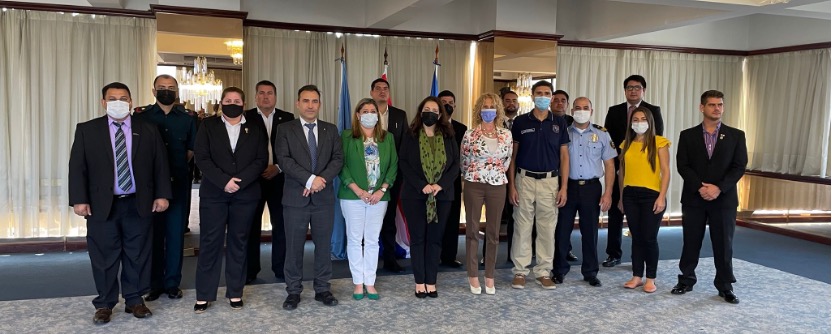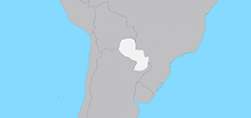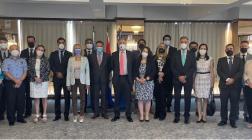
UNODC Global Firearms Programme Workshop in cooperation with the government of Paraguay on efforts to support the creation of an Integrated Firearms Centre
On 10 and 11 March 2022, in the framework of the project “Countering transnational illicit arms trafficking through the implementation of the United Nations Convention Against Transnational Organised Crime and its Firearms Protocol”, the UNODC Global Firearms Programme organised a workshop aimed at building on the conclusions of a previous workshop organised in October 2021. The aim this follow-up meeting was to agree on next steps for the formation of the centre and establish a Technical Working Group for the development and draft a proposal to create an Integrated Firearms Centre in Paraguay. The workshop brought together 17 national experts from the National Police, the National Directorate of War Materials (DIMABEL), the Public Ministry, the National Customs Directorate, the National Anti-Drug Secretariat (SENAD), the Judiciary and the Ministry of Foreign Affairs.
The project “Countering transnational illicit arms trafficking through the implementation of the United Nations Convention Against Transnational Organized Crime and its Firearms Protocol” has as its overall objective to prevent and counter the illicit manufacturing of and trafficking in firearms, and their links to transnational organised crime and terrorism, through the ratification and implementation of the Protocol against the Illicit Manufacturing of and Trafficking in Firearms, their parts and Components and Ammunition, supplementing the United Nations Convention Against Transnational Organized Crime (UNTOC). The project is implemented by the Global Firearms Programme (GFP), established by the first project funded by the European Union (EU) (IFS /2010 /259-204), which builds upon five interconnected pillars, including: (1) adequate policy and legislative frameworks, (2) implementation of comprehensive firearms control and regulatory frameworks, (3) effective criminal justice responses to illicit trafficking and related crimes, (4) broad international cooperation and regular exchanges of information and expertise through communities of practitioners, and (5) enhanced knowledge and intelligence on firearms trafficking to monitor illicit trafficking flows.
The project’s outcomes aim at supporting these interconnected building blocks, and the activities programmed in order to achieve them include four outputs, namely: (1) increase awareness of the firearms issue and its international responses, and adequate policy and legislative frameworks in place, in line with relevant international and regional instruments; (2) increase capacities of countries and sub-regions to implement effective firearms control regimes in line with the Firearms Protocol and other relevant instruments, and to prevent, investigate and prosecute firearms trafficking and related offences through effective national response and international law enforcement and judicial cooperation; (3) support effective cooperation and sharing of information and good practices among communities of firearms and organised crime/terrorism practitioners, through regular contacts and use of specialised cooperation networks and platforms and taking advantage of existing initiatives; and (4) improve capacity to monitor, analyse and identify synergies for firearms legislation and case-law with and amongst other forms of transnational organised crime, including cybercrime, money laundering, illicit drug trafficking, smuggling of migrants, or terrorism, inter alia.












